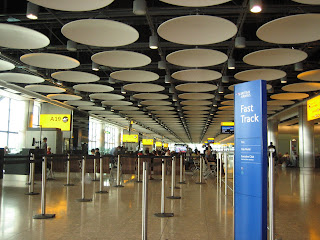I live in Namanga, a mostly Tanzanian neighborhood just down from the mostly expat peninsula. Looking out from my balcony, the neighborhood is an ocean of corrugated tin roofs, palm trees, dirt roads, and small cement dwellings.

My apartment building

The view from the balcony
Though people sit by the side of the road all day long all the time in Dar, like this pair of guys who hang out with the guard outside my gate:

...something struck me as odd about this makeshift gathering: the men weren’t eating or drinking or playing cards, or even talking much. They were just sitting there. When I came home to the same scene the next day, I began to worry: is this permanent? How can they just decide to block the road? And why are they just sitting there?
As happens with so many things (!) I hadn’t understood all or even most of the story. It turns out they weren’t just sitting. They were there for a funeral. A woman had died in the house behind the store front, and scores of men and women had gathered around to mourn her. I don’t know her name and I’m not sure why she died. Her death could have been natural or brought on by any of the many diseases and afflictions that kill people in this country. What I do know is that she was 48 years old. That may seem young, but it is only a little bit younger than the average age people are expected to die here (55 years old).
You see signs of it everywhere—sickness, death, mortality. A taxi driver with elephantitis; a man who lifts his pant leg to reveal an open, mucous-covered wound; a woman so thin she looks like a skeleton; wood workers who peddle in coffee tables and caskets; and very public funeral processions.
There are so many sicknesses, just like home, except here, the tragedy is how much of it could be prevented, but is not. Like stunting. People who look too young and too short for their age, who never received the vitamins and minerals they needed as children and so are permanently and irreversibly damaged, physically and cognitively. And malaria, that deadly—and preventable and treatable—fever that is the leading cause of death for children in Tanzania. And then there’s diarrhea, borne from dirty water, dirty hands, dirty fruits and vegetables, which only takes a couple of days to kill you, but is easily treatable with cheap oral rehydration salts and antibiotics.
***
My roommate who saw the ceremony described it as modest. A priest in a white robe said a prayer. Heads were bowed. A hymn was sung out in the open air. Flowers were gently placed on a wooden casket.
And then they sat. Not just for a half an hour, but for days. For days they were just there. Present. Maybe they couldn’t do anything. Maybe the small donation of money they gave the family (which is custom) isn’t enough to cover the financial loss that the death of a working adult brings. Maybe their assembly won’t stop others who are sick from dying. But they were there, with them. The family was not alone.
***
I felt sheepish afterwards. The road is obstructed! What a thing to complain about in the face of a woman who has died. But then, the truth is, I’m not very good at dealing with inconvenience. And I'm guessing that this makes me a little bit like you. We are, none of us, but especially Americans, very good at dealing with things that interrupt the quantifiable order of our lives.
And nothing is as disruptive as death. Maybe that's why we keep it so hidden. When, after all, was the last time you saw a graveyard in a U.S. city? It’s probably been a while because they are located in far-out, hidden places, so we don't have to be reminded of the unpleasantness and uglines of loss, sickness, and grief.
But in Tanzania, it's out in the open. Which makes it all the more interesting—how easy it is to miss things (like I did). Even when they are right in front of your eyes.

The now empty store front where the funeral was held























